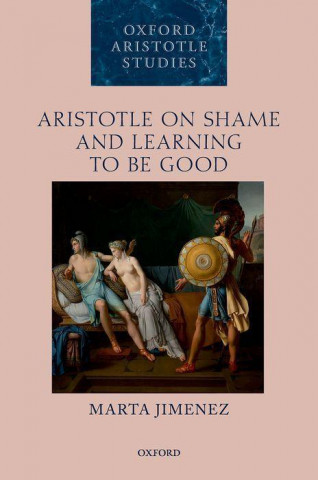
Code: 33337204
Aristotle on Shame and Learning to Be Good
by Jimenez, Marta (Associate Professor, Associate Professor, Emory University)
This book presents a novel interpretation of Aristotle's account of how shame instils virtue, and defends its philosophical import. Despite shame's bad reputation as a potential obstacle to the development of moral autonomy, shame ... more
- Language:
 English
English - Binding: Hardback
- Number of pages: 224
Publisher: Oxford University Press, 2020
- More about this

You might also like
-

Periphyseon on the Division of Nature
42.61 € -15 % -

Cambridge Companion to Hermeneutics
118.58 €
Give this book as a present today
- Order book and choose Gift Order.
- We will send you book gift voucher at once. You can give it out to anyone.
- Book will be send to donee, nothing more to care about.
More about Aristotle on Shame and Learning to Be Good
You get 288 loyalty points
 Book synopsis
Book synopsis
This book presents a novel interpretation of Aristotle's account of how shame instils virtue, and defends its philosophical import. Despite shame's bad reputation as a potential obstacle to the development of moral autonomy, shame is for Aristotle the proto-virtue of those learning to be good, since it is the emotion that equips them with the seeds of virtue. Other emotions such as friendliness, righteous indignation, emulation, hope, and even spiritedness may play important roles on the road to virtue. However, shame is the only one that Aristotle repeatedly associates with moral progress. The reason is that shame can move young agents to perform good actions and avoid bad ones in ways that appropriately resemble not only the external behavior but also the orientation and receptivity to moral value characteristic of virtuous people. By turning their attention to considerations about the perceived nobility and praiseworthiness of their own actions and character, shame places young people in the path to becoming good. Although they are not yet virtuous, learners with a sense of shame can appreciate the value of the noble and guide their actions by a true interest in doing the right thing. Shame, thus, enables learners to perform virtuous actions in the right way before they have practical wisdom or stable dispositions of character. This book solves a long-debated problem concerning Aristotle's notion of habituation by showing that shame provides motivational continuity between the actions of the learners and the virtuous dispositions that they will eventually acquire.
 Book details
Book details
114.55 €
- Full title: Aristotle on Shame and Learning to Be Good
- Author: Jimenez, Marta (Associate Professor, Associate Professor, Emory University)
- Language:
 English
English - Binding: Hardback
- Number of pages: 224
- EAN: 9780198829683
- ISBN: 019882968X
- ID: 33337204
- Publisher: Oxford University Press
- Weight: 506 g
- Dimensions: 241 × 165 × 19 mm
- Date of publishing: 31. December 2020
Trending among others
-

Gravity Falls Journal 3
16.41 € -23 % -

Berserk Deluxe Volume 1
44.32 € -11 % -

Berserk Deluxe Volume 2
52.18 € -

White Nights
3.52 € -23 % -

It ends with us
8.65 € -19 % -

48 Laws Of Power
18.03 € -9 % -

Berserk Deluxe Volume 3
48.76 € -3 % -

A Little Life
17.52 € -

Atomic Habits
16.21 € -29 % -

Surrounded by Idiots
10.47 € -29 % -

Jujutsu Kaisen, Vol. 23
9.66 € -26 % -

The Official Stardew Valley Cookbook
22.36 € -22 % -

The 48 Laws of Power
24.57 € -5 % -

Berserk Deluxe Volume 4
45.23 € -10 % -

A Good Girl's Guide to Murder
8.15 € -25 % -

Iron Flame
16.21 € -18 % -

Berserk Deluxe Volume 5
50.47 € -

A Curse For True Love
10.37 € -12 % -

Twisted Hate
10.17 € -14 % -

It Starts with Us
10.67 € -17 % -

Powerless
10.47 € -18 % -

Twisted Love
9.76 € -24 % -

Reckless
10.27 € -20 % -

The Husky and His White Cat Shizun: Erha He Ta de Bai Mao Shizun (Novel) Vol. 6
16.21 € -19 % -

Twisted Lies
9.76 € -17 % -

Vagabond (VIZBIG Edition), Vol. 1
24.57 € -

Court of Mist and Fury
9.36 € -18 % -

Berserk Deluxe Volume 6
51.17 € -

Everything I Know About Love
10.37 € -29 % -

Court of Thorns and Roses Paperback Box Set (5 books)
49.96 € -20 % -

Fourth Wing
10.27 € -28 % -

Twisted Games
9.76 € -17 % -

Psychology of Money
18.83 € -4 % -

The Courage To Be Disliked
10.97 € -14 % -

A Court of Wings and Ruin
10.77 € -6 % -

A Court of Silver Flames
10.17 € -20 % -

The Ballad of Never After
10.17 € -20 % -

Meow
20.75 € -

Once Upon A Broken Heart
9.86 € -23 % -

Berserk Deluxe Volume 7
47.95 € -4 % -

Secret History
9.76 € -17 % -

Jujutsu Kaisen, Vol. 1
9.36 € -21 % -

Heaven Official's Blessing: Tian Guan Ci Fu (Novel) Vol. 1
17.62 € -16 % -

Good Girl, Bad Blood
8.55 € -20 % -

Guardian: Zhen Hun (Novel) Vol. 3 (Special Edition)
24.98 € -16 % -

As Good As Dead
9.06 € -16 % -

No Longer Human
13.39 € -16 % -

Heaven Official's Blessing: Tian Guan Ci Fu Vol. 4
17.62 € -12 % -

The Creative Act
24.07 € -24 %
Collection points Bratislava a 2642 dalších
Copyright ©2008-24 najlacnejsie-knihy.sk All rights reservedPrivacyCookies



 15549 collection points
15549 collection points Delivery 2.99 €
Delivery 2.99 € 02/210 210 99 (8-15.30h)
02/210 210 99 (8-15.30h)